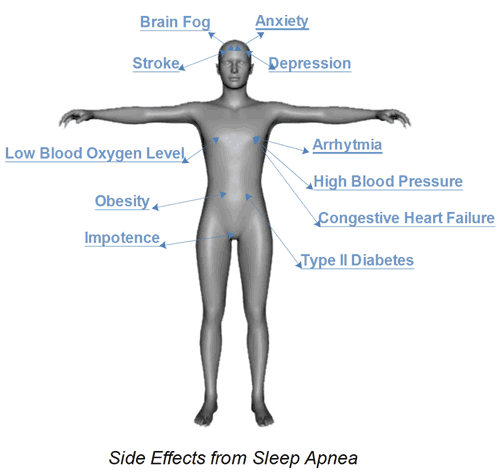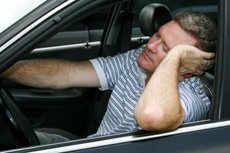Sleep Apnea Side Effects
How Does Sleep Apnea Affects Your Body?

Sleep apnea side effects can really mess up your life. It has a significant impact on:
- daytime activities,
- quality of life,
- cognitive performance, morbidity and mortality,
- and high risks for other medical conditions.
In this page you'll discover what can happen to your body if you have sleep apnea for more than 1 month without using any treatment.
What Are The Side Effects of Sleep Apnea?
Graphic Representation of Sleep Apnea Side Effects:
Please click the links from this image to learn more about the side effects of sleep apnea:

Cardiovascular Problems in Sleep Apnea Patients
Here are the most common life threatening cardiac problems encountered in apnea patients:
- High Blood Pressure - About 50% of sleep apnea patients have hypertension, and almost 30% of hypertensive patients also have sleep apnea, often undiagnosed.
- Stroke - Clinical studies demonstrated that obstructive sleep apnea (OSA) is common in patients who suffer a stroke, with a prevalence of 60% to 80%
- Arrhythmia - heart damage and stroke, are the most common causes of sudden death that occur during sleep in patients with OSA.
- Congestive Heart Failure - occurs if your heart cannot fill up with enough blood or pump sufficient amounts of blood with enough force to the rest of your body.
- Low Blood Oxygen Level - a normal blood oxygen level should be 94% to 98%. However, as a result of not breathing for 30 seconds or more during sleep, your sleep apnea oxygen level would drop to 80% or less.
Sleep Heart Health Study
A clinical study demonstrated that patients who have obstructive sleep apnea (OSA) with AHI greater than 11 events per hour have 42% higher risk of having life threatening cardiovascular problems, than those with AHI less than 1.3 events per hour.
The results were analyzed in the Sleep Heart Health Study.
Metabolic Side Effects from Sleep Apnea
OSA is associated with the development of type 2 diabetes, obesity and glucose intolerance.
If your sleep duration is too short or too long, or if you wake up many times during the night (sleep fragmentation), then you have a high risk to develop these problems.
Patients can develop obesity from OSA; Moreover, the reciprocal is also true: gaining weight can cause sleep apnea.
For more on obesity as a direct link to OSA, see Sleep Apnea and Obesity.
Mental Side Effects of Sleep Apnea
Reduced mental function, including vigilance, mood and executive function (working memory, planning, problem solving, organization) are common consequences of OSA.
Here are some examples of mental functioning problems from sleep apnea:
Mental functioning problems from sleep apnea
|
Short term and long term memory loss |
- getting in the shower with your clothes on. |
|
Irascibility |
- getting angry quickly. |
|
- there is 60% increased risk of having depression. | |
|
Lower average intelligence |
- feeling less smart than you used to be. |
|
Poor creativeness |
- lack of imagination and creativity. |
|
- being scared to sleep from sleep apnea. | |
|
Loss of balance |
- For example, getting dizzy from sudden moves or turns. |
|
Slow thinking |
- simple tasks that are difficult to resolve. |
|
- a feeling of detachment from everyday's life. |
Vehicle Accidents from Sleep Apnea

People with moderate to severe OSA have a high risk of having car accidents.
The risk of having critical injuries or dying is also high enough, not only for the sleep apnea patient, but also for the other drivers involved in traffic.
Driving a car is a complex task that requires strong mental functions such as dexterity, vigilance, sharpness of vision. These functions are badly affected by sleep apnea.
For more on car accidents from OSA, see Drowsy Driving.
Quality of Life and Sleep Apnea Side Effects
The most common effects of untreated sleep apnea on your life's quality:
- erectile dysfunction and poor sexual function - man patients with OSA have a decrease in testosterone levels, which affect sexual and reproductive function.
- difficulties in having social relationships, family activities and sexual relationships.
- increased risk of mortality - several large studies have shown that less than 5 hours sleep increase the risk of mortality with 15%. That's why untreated patients with sleep disorders, including sleep apnea and insomnia, are more prone to dying.
For more on death from sleep disorders, see Sleep Apnea Death.
Home › Sleep Apnea Side Effects







